Thyme Varieties That Are Said To Have Pest Repelling Capabilities
It might surprise you to learn that there are around 350 different species of thyme that you could grow in your garden. While some of these make excellent ground covers and are perfect for planting in between pavers or as an alternative lawn, others grow as small aromatic shrubs, and are often used for culinary purposes. Even though there's very little scientific evidence that definitively proves that herbs can repel pests, there are some thyme varieties that have been used by gardeners for centuries to keep certain pests away. The top thyme varieties that are said to have pest repelling or controlling capabilities include common thyme, lemon thyme, and creeping thyme.
Common thyme (Thymus vulgaris) is the one you're probably most familiar with as a culinary herb. It grows beautifully in a herb garden or among your vegetables. It's said to deter cabbage worms, making it an ideal companion for all of your brassica vegetables such as cauliflower, cabbage, kale, and broccoli. When in bloom, it also attracts bees and butterflies. As it has good pest resistance, you can assume it may help to repel other unwanted bugs thanks to its strong fragrance. The spicy aroma may help to mask the scents of other plants growing nearby, thus preventing insects, like whiteflies, from making a beeline for your veggie patch. You may also be aware that this popular herb can keep ants from invading your garden, and a study conducted by the University of Mississippi School of Pharmacy's National Center for Natural Products Research has confirmed that the essential oil in thyme can repel fire ants.
Lemon thyme can repel certain pests effectively
If you have a problem with mosquitoes in your yard, lemon thyme (Thymus citriodorus) could be your next best friend, because growing this garden herb will help keep pesky mosquitoes at bay. There's even some scientific evidence to help back up this claim. However, it will be most effective if you crush the leaves and rub the oils released onto your clothing. Just note that if you intend to rub these crushed leaves onto your skin, they may cause irritation.
Ideally, planting some lemon thyme in a pot and placing this near your outdoor seating area can help to keep those pesky mosquitoes away, especially if you brush past the plant to release even more of its strong aroma. It would be even better if you can grow it as a ground cover between your pavers, because stepping on and crushing the leaves will release all those aromatic oils. Apart from its mosquito repelling capabilities, lemon thyme is also said to deter other common pests such as cockroaches and termites.
Creeping thyme is great at attracting predatory insects
If you want to keep those pest populations under control, it's a good idea to attract beneficial insects to your yard. To do this, you might want to grow creeping thyme (Thymus praecox or Thymus serpyllum) as a pretty ground cover. This plant is often used as a lawn substitute or to plant in between large paving stones. It also looks fantastic when grown at the top of a wall so it can cascade down and fill the air with its spicy aroma.
While this useful thyme variety will attract pollinators, it's also said to attract predatory insects such as syrphid flies. These are highly beneficial insects to have in your yard because their larvae feed on garden pests such as scale, aphids, and thrips. It's also believed that Thymus serpyllum can attract tachinid flies and other parasitoids, which live inside or on the body of a pest insect and feed on it. Another reason you'll love planting red creeping thyme in your yard is that it's both deer and rabbit resistant. This means you could use it around your most treasured veggie and flower beds, and one sniff of the herb will hopefully send these animals in the opposite direction.


